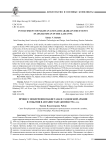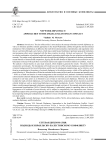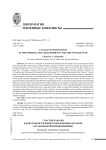Дипломатия и военные конфликты. Рубрика в журнале - Вестник ВолГУ. Серия: История. Регионоведение. Международные отношения

Involvement of Pakistan and Saudi Arabia in the events in Afghanistan in the late 1970s
Статья научная
Introduction. In this article, the author examines the position of the countries of the Middle East region in the late 1970s with regard to the armed conflict in Afghanistan. The emphasis is on the period on the eve of the entry of the Soviet troops to Afghanistan - from the April Revolution of 1978 until December 1979. The author’s focus is on two states: Pakistan directly bordering on Afghanistan, and Saudi Arabia, which is a major geopolitical actor in the region. Methods and materials. The author relies on documentary sources such as “Department of state bulletin”, documents of secret correspondence of the U.S. foreign policy agencies, documents of the U.S. National Security Archive, and special volumes on Afghanistan and the Middle East in “Foreign Relations of the United States. Diplomatic Papers, 1977-1980”. Thanks to these sources, it is possible to prove that the involvement of the states of the region in the Afghan armed conflict and its internationalization began even before the Soviet troops entered Afghanistan. Analysis. First, an overview of the objectives pursued by these states in Afghanistan and in the internal Afghan armed conflict is given. Following this, the author consistently reveals the position of these states in relation to the April Revolution of 1978, the ever-increasing Soviet involvement in the Afghan events (1978-1979) and the civil war that started against the Kabul government. Results. In conclusion the article reveals the role of these states in the process of internationalization of the Afghan armed conflict, which, according to the author, began before the Soviet troops entered Afghanistan.
Бесплатно

Network diplomacy: approaches to the Israeli-Palestinian conflict
Статья научная
Introduction. The aim of the article is to to analyze the concept of modern network diplomacy as well as to illustrate possible solution approaches to the Israeli-Palestinian conflict through the abovementioned mechanism. Network diplomacy is defined as the multi-level communication, representation, and negotiation of an idea or a set thereof through a set of actors, which may extend beyond traditional, rigid state sponsored institutions and encompass other actors integrated with the idea or parties involved. Methods and materials. The research involved a combination of analytical empirical research containing justification for case selection and qualitative research. The author mostly approaches the topic through liberal paradigm of international relations, accentuating mutual benefits of international cooperation, arguing that flexible formats of diplomacy can be an effective way to help states to interact with each other in an honest manner and support nonviolent solutions to conflicts. Analysis. The analysis is based mainly on case study research, which helped to generate the results. The article will be structured in several parts. The introduction will render an overview of the network diplomacy concept followed by a historic background of the Israeli-Palestinian conflict and its ideological underpinnings, and so inform a set of theories as pertaining to the potency of network diplomacy in the solution process, which will be outlined in the parts following it. These theories will then be evaluated in the context of the overall environment and specific cases- NGOs as a reach out function in water management at the municipal level, academic institutions establishing communication channels independent of the larger political environment, and a short summary of European Union outreach to non-state actors as an illustrative case of state to non-state actor diplomacy. Moreover, the article includes the study of citizen diplomacy, civil society-based approaches, economically driven incentives and other cultural initiatives such as sports-based diplomacy as possible mechanisms. Results. Network diplomacy may feature a multi-pronged approach to diplomacyrepresented through a mixture of, for example, state actors and non- governmental organizations (NGOs). Network diplomacy is particularly potent in spreading ideas as it allows engagement of a multitude of actors directly, and is subject to comparatively low transaction costs. Network diplomacyappears to be a promising approach to the solution of the Israeli-Palestinian conflict which is characterized by juxtaposing ideological underpinnings in addition to issues of realpolitik, and a multitude of actors including non-state actors.
Бесплатно

Участие Канады в деятельности имперских военных органов в годы Первой мировой войны
Статья научная
Статья посвящена изучению процесса создания и функционирования системы единого военного управления Британской империей в годы Первой мировой войны. Ключевую роль в этом процессе сыграла Канада как одно из самых влиятельных автономных образований, входивших в состав империи на правах доминиона. Реконструкция процесса участия Канады в создании и деятельности имперского военного кабинета и двух имперских военных конференций 1917 и 1918 гг. позволит объяснить эволюцию внутри- и внешнеполитического статуса Канады в составе Британской империи после окончания войны. На основе парламентских документов Канады и Великобритании, отчетов и протоколов заседаний имперских военных конференций и имперского военного кабинета анализируются причины создания имперских военных организаций в Британской империи в годы войны. Исследуется взаимная реакция британского и колониального общества на прямое участие в заседаниях британского кабинета министров представителей доминионов. Выявляются организационные и функциональные различия между двумя имперскими военными организациями: кабинетом и конференциями. Подробно изучается деятельность имперских военных организаций в годы войны, определяется роль канадской делегации в этом процессе. Анализируются решения имперских военных органов, выявляются их внутри- и внешнеполитические последствия для доминиона. В целом активное участие Канады в создании и деятельности органов единого военного управления в годы Первой мировой войны явилось одним из факторов трансформации Британской империи в Содружество наций, а также формирования канадской идентичности, ее внутри- и внешнеполитической самостоятельности в границах империи.
Бесплатно

